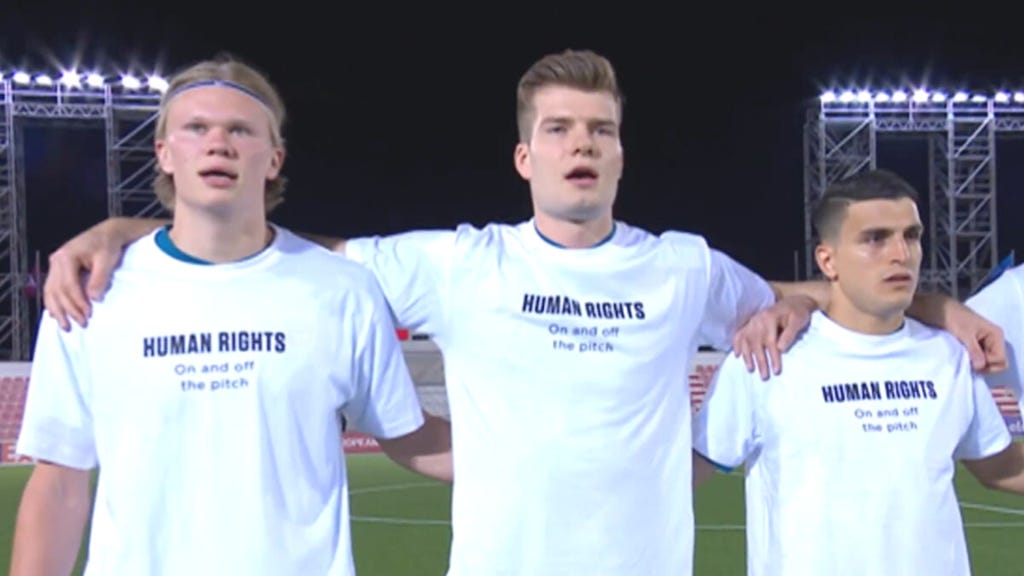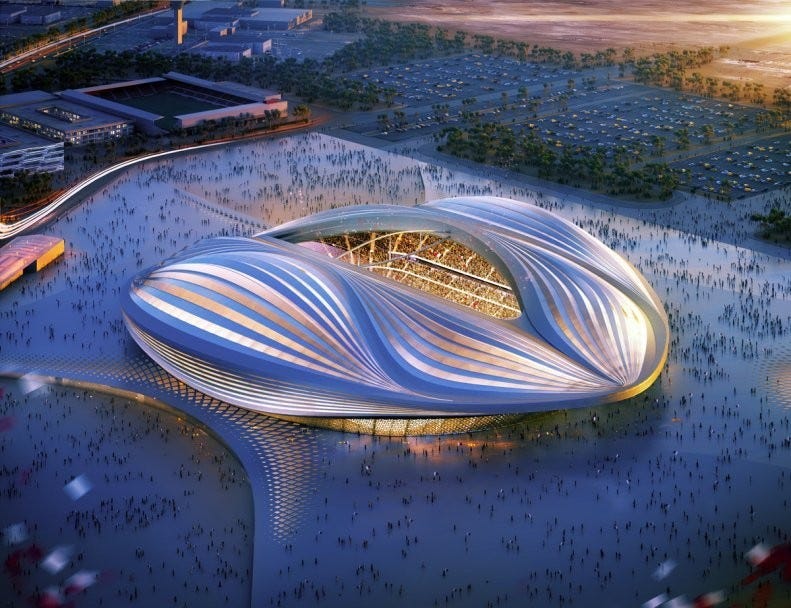Thoughts About Qatar '22.
With the "most controversial" World Cup to date just a few days away, I wonder: is the boycott yet again another attempt at white saviourism?
“Sportswashing is a term used to describe the practice of individuals, groups, corporations, or governments using sports to improve reputations tarnished by wrongdoing. Sportswashing can be accomplished through hosting sporting events, purchasing or sponsoring sporting teams, or participating in a sport. At the international level, it is believed that sportswashing has been used to direct attention away from poor human rights records and corruption scandals. At the individual and corporate levels, it is believed that sportswashing has been used to cover up vices, crimes, and scandals. Sportswashing is an example of reputation laundering.” – Wikipedia
As somebody who makes a living by talking about football culture and its various intersections, the last six months have been packed with conversations about the upcoming World Cup and how Qatar has used the most loved tournament to convince people they are not so bad afterall–unfortunately for them, it is quite obvious they miserably failed at the latter.
Matter of fact, not only the attempt at covering their wrong doings by bringing the beautiful game to the desert massively backfired on them, their inherent unscrupulousness was brought to the surface even more.
For the most part, I understand the need to denounce what is going on in the country; the sour sentiment stems from good intention. It’s important to condemn bad actions and make an example out of what things shouldn’t be like, you know, giving the death sentence to gay people, jailing lovers for holding hands, confiscating the passports of construction workers and forcing them to labor in 50° weather with little to no breaks.
(Fun Fact: legend narrates that in the Middle East the thermometer never goes above 49° because then all work would have to stop–the country would have to declare a National holiday.)
But from the perspective of somebody who lived and worked in the region for quite some time, I don’t think the attacks on the tiny Gulf country are doing what people think they will do–it’s performative at its best.
For one, the Qatari government allegedly bought the bid out and the news of this corrupted transaction was made public many years ago, in 2015, still, they faced little to no repercussions. Personally, I do not recall many people rallying outside of FIFA’s HQ in Zurich asking to apprehend the decision.
The conversation is happening too little too late, mostly on the internet–another space that is heavily regulated on that side of the world–amongst white yuppies who are watching the controversy play out from the comfort of their design apartments in Europe.
“BOYCOTT QATAR! DO NOT WATCH THE WC!”read the captions of angry Internet activists and the headlines of independent media.
Their outcry opens the floor for the following questions: will they stop watching the Premier League? Paris Saint Germain? Disown their favorite clubs? How will their actions actually make an impact? So far, I haven’t seen anybody come out with clear points or critical reasoning strong enough to convince me to join their mission and repeat the political statement in unison.
In a way, Qatar is boycotting itself by laying out a calendar which barely anyone in the Western world (aka the people who are most complaining about the event) will be able to keep up with. Needless to say, the unprecedented winter schedule is an abomination.
As hated as this year’s edition is, it still hasn’t stopped brands from pretending to care about human rights while selling cheap t-shirts made in sweatshops where the condition of the workers are similar, if not parallel, to the South Asian construction workers that lost their life in the years leading up to November 20th.
The controversy has become such a big FOMO element that even DIET PRADA made a post about the situation following Dua Lipa’s Instagram statement clarifying she won’t actually perform at the opening celebration.
Oddly, they gathered some of the weirdest headlines. Like one that mentions Beckham as a “gay icon”? Or another one that communicated Rod Stewart’s decision to turn down more than 1 million dollars that was offered to him to perform.
I am interested in knowing who thought he would be a good act for the event but that’s a question for another time I guess.
Truth be told, there are too many layers that need to be peeled back in order for people to successfully ostracize football corruption.
Why was there barely any public outrage for Russia 2018? Is it because it was in the summer, people weren’t mad at the fact that they couldn’t follow the schedule and their respective local championships weren’t disrupted? Or is it because activism wasn’t yet a trend? So many questions, so little time.
Secondly, Qatar is not the kind of place that cares about low level football tourism.
The average price for a hotel room during the four weeks of the tournament is purposefully exclusionary; Qatar does not want rowdy drunk hooligans to flock to their bars (they have no bars for a reason) for cheap beer (the country does not allow alcohol).
For them, this World Cup is a tool to strengthen the relationship with FIFA, to showcase their infrastructure to corporate football and to potentially become a go-to destination for international sports investment.
You know those pre-season games and training camps that sometimes happen in Dubai1? They want in on those.
The Qatari Football Federation has been working hard to find its spot on the international football scene for many years.
It didn’t start ten years ago with the announcement that they would be a host country.
The hustle began by bringing famous players that we all love over in the second half of the first decade of the new millennium. Effenberg, Xavi, Desailly, Batistuta..Hell! Even everybody’s favorite manager Pep Guardiola got a Qatari bag before retiring.
It is no coincidence that PSG, arguably one of the most prominent and profitable clubs in Europe, is owned by Qatar investors.
Sanctions and rules were always harsh too. Remember the famous altercation between Houssine Kharja and Nene? (Ok maybe this is a bit too sectorial for my readers and game’s newcomers).
The Morocco National’s was disqualified and dismissed from the team without notice because of this regular on the pitch physical quarrel.
The strict behavior (perpetually discussed only through an Occidental lens) is a custom of the place.
Last but not least, sponsors have already poured heavy cash into the pockets of the Sheiks and governmental agencies profiting off the World Cup; streaming rights purchased by big networks a long time ago and the construction workers who died were replaced shortly after their expiration because that’s just how it, sadly, works out there.
Another thing that just doesn’t sit right with me is the fact that none of these publications who are “canceling” the World Cup have centered the voices of people on the ground–Goal Click was the only media to highlight the experience of people living in the country. This whole discourse has been, as always, filled with white saviorism.
Why have very few platforms felt the need to allow underrepresented voices from the region to give their opinion on the topic? Is it because indignation brings more clicks and subsequently better financial outcomes for their companies?
I think that the only way to attempt to right the wrongs perpetuated by corporate institutions such as the FIFA in instances as such is to focus on making an impact at grassroots level.
If only half of the energy spent on listing all of the reasons why Qatar ‘22 should not be watched were invested in highlighting organizations that play outside of these rigged corporate rules and need support, underserved youth would have more places to go play in safety.
As cynical as my take may be, I simply do not see the boycott–or rather, the think pieces mansplaining why we shouldn’t rejoice at the moment–of the upcoming World Cup as a viable solution to straighten out football’s endless streak of corruption.
Will the “activists” continue to apply pressure after the final is played and we have a winner? Are Qatar’s (and all of the rest of the Gulf) human rights violations going to continue to be condemned? Or is it all going to become an old nightmare once the hype dies off?
As fucked up as FIFA’s president Gianni Infantino is, his “Let’s focus on the football” comment, if analyzed and contextualized, wasn’t as controversial as many made it out to be for me–sure, footballers should do their part and use their platform to shed light on sad situations, but at the same time, isn’t it hypocritical? Where do their salaries come from? Do they pledge money to charities? Do they volunteer?
At the end of the day, the only radical way to puncture football business’ venomous essence is to try and make an impact at a local level by doing whatever we can to level the playing field.
The world is a corrupted place, there’s no denying it. So why not use a moment of aggregation like the World Cup to be kinder to the people around us instead of focusing our energy on yelling how everything is ugly and the system is rigged?
By the way, where is the outrage for those? Because Dubai silently does the same stuff as Qatar, except their Westernized fool’s gold approach acts as a Men In Black memory eraser tool.






